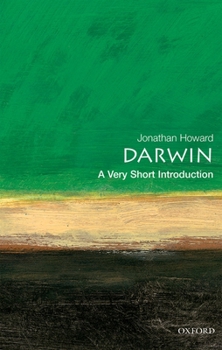Darwin: A Very Short Introduction
(Part of the Very Short Introductions (#35) Series, Oxford's Very Short Introductions series Series, and Very Short Introductions (#35) Series)
Select Format
Select Condition 
Book Overview
Darwin's theory that man's ancestors were apes caused an uproar within the scientific world, as well as public frenzy when The Origin of Species was published in 1859. Arguments still rage about the implications of his evolutionary theory, and skepticism about the value of Darwin's contribution to knowledge is widespread. In this analysis of Darwin's major insights and arguments, Jonathan Howard reasserts the importance of Darwin's work for the development of modern biology. He offers a stimulating view of the famous scientist in a concise, handy format, making it a masterpiece for all Darwinians as well as for all general readers of popular science. About the Series: Combining authority with wit, accessibility, and style, Very Short Introductions offer an introduction to some of life's most interesting topics. Written by experts for the newcomer, they demonstrate the finest contemporary thinking about the central problems and issues in hundreds of key topics, from philosophy to Freud, quantum theory to Islam.
Format:Paperback
Language:English
ISBN:0192854542
ISBN13:9780192854544
Release Date:June 2001
Publisher:Oxford University Press
Length:144 Pages
Weight:0.33 lbs.
Dimensions:0.4" x 4.5" x 7.0"
Customer Reviews
2 ratings
Very good and still timely
Published by Thriftbooks.com User , 16 years ago
I think the extent of knowledge most people know about Darwin is about evolution and even that is spotty. I just wanted to get a broad idea about the man and his theories and this book fit the bill. I feel like I can now speak about Darwin and actually know what I am talking about rather than make off handed commments with out fully realizing what I am talking about. I recommend this book to Atheists and people of faith since each of us could benefit from understanding what Darwin is about and the context of his theories.
Exellent presentation of the views of Darwin
Published by Thriftbooks.com User , 19 years ago
This book opens with a summary of the life of Darwin born in 1809 who published ' Origin of the Species' in 1859, only upon learning that another researcher Wallace was about to publish the identical finding .i.e. that natural selection was the mechanism of Evolution of Species. Howard writes sympathetically of Darwin the man and researcher. Aside from the five years on the Beagle expedition Darwin spent all his life in London and in his country home a few miles outside it. Blessed with a long and happy marriage, timid by nature and physically ill for most of his life Darwin used the family wealth ( his mother was from the Wedgewood pottery family) to have time for his researches. Devoted to his family ( He deeply grieved the loss of three of his children) he worked at home putting together the findings that would revolutionize Mankind's way of thinking not only about the development of the natural world, but of Mankind itself. Howard shows the sources of natural selection in Darwin's close understanding of the Earth's development through his reading and friendship with the great geologist Lyle, in his adoption of a Malthusian idea of struggle for survival, and in his precise observations of living species and the fossil record. Howard also shows how the idea of evolution through natural selection was championed and brought forward by T.H. Huxley. There are chapters also on ' The evidence for natural selection,' on 'Sex , variation and heredity,' on ' Man' on 'Perfection and Progress' on 'Darwinism and ideology' and on 'Darwin as a scientist: an evaluation'. Howard attempts in the course of the exposition to refute those who have denied the validity of 'natural selection' and of the ' evolution of species'. His arguments are complicated and not always easy to follow , but seem soundly argued. I believe that this is an excellent introductory work to understanding the main ideas and thrust of Darwin's thought. I would only add a personal note. I am one of those people for whom the findings of Darwin present a deep emotional and religious challenge. The Biblical idea of special creation is at the heart of my own religious belief and conception of human dignity. Along with this there is the basic human need and from my own religion, Judaism's point- of- view religious requirement to seek and know the truth. What happens when the truth scientifically revealed contradicts a basic element in one's own religious belief? I know no easy or satisfactory answer to this question.





